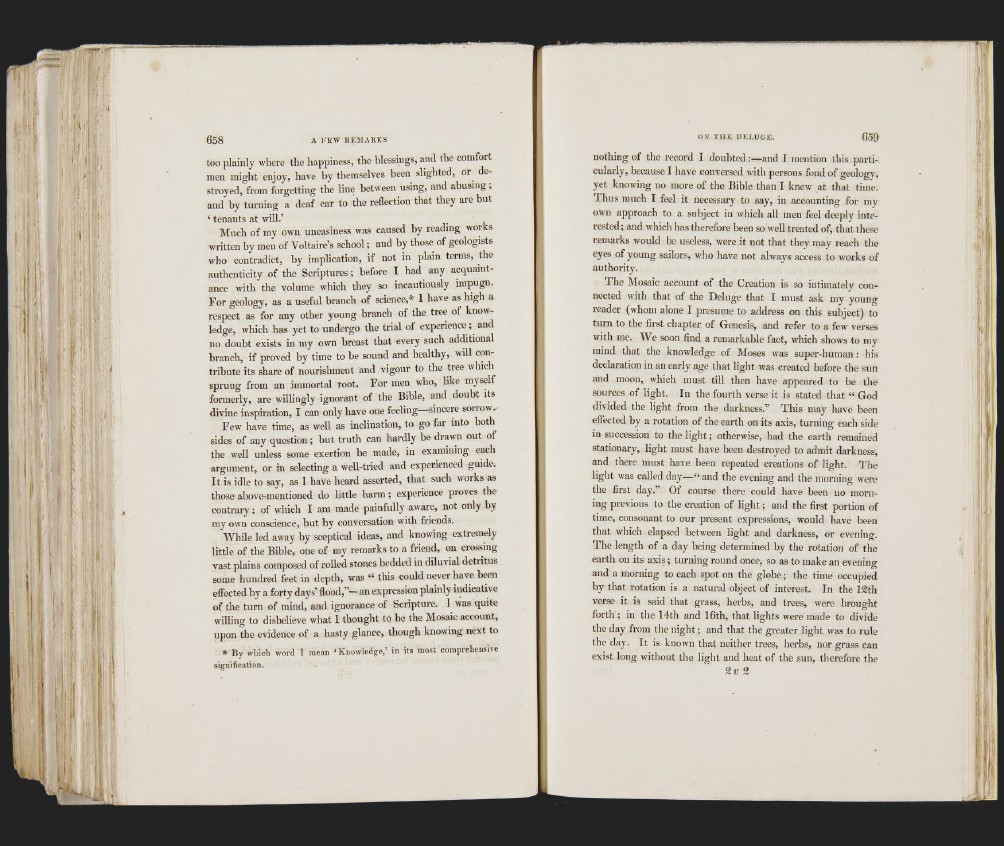
; 1'1 lI I 'f >l 71
too plainly where the happiness, the blessings, and the comfort
men might enjoy, have hy themselves been slighted, or destroyed,
from forgetting the line between using, and abusing;
and by turning a deaf ear to the reflection that they are but
‘ tenants at will.’ ,
Much of my own uneasiness was caused by reading works
written by men of Voltaire’s school; and by those of geologists
who contradict, by implication, if not in plain terms, the
authenticity of the Scriptures; before 1 had any acquaintance
with the volume which they so incautiously impugn.
For geology, as a useful branch of science,* 1 have as high a
respect as for any other young branch of the tree of knowledge,
which has yet to undergo the trial of experience; and
no doubt exists in my own breast that every such additional
branch, if proved by time to he sound and healthy, will contribute
its share of nourishment and vigour to the tree wluch
sprung from an immortal root. For men who, like myself
formerly, are willingly ignorant of the Bihle, and doubt its
divine inspiration, I can only have one feeling—sincere sorrow.-
Few have time, as well as inclination, to go far into hoth
sides of any question; but truth can hardly be drawn out of
the well unless some exertion he made, in examining each
argument, or in selecting a well-tried and experienced guide.
I t is idle to say, as I have heard asserted, that such works as
those above-mentioned do little harm; experience proves the
contrary; of which I am made painfully aware, not only by
my own conscience, but hy conversation with friends.
While led away by sceptical ideas, and knowing extremely
little of the Bible, one of my remarks to a friend, on crossing
vast plains composed of rolled stones bedded in diluvial detritus
some hundred feet in depth, was “ this could never have hren
effected by a forty days’ flood,”—an expression plainly indicative
of the turn of mind, and ignorance of Scripture. I was quite
willing to disbelieve what 1 thought to he the Mosaic account,
upon the evidence of a hasty glance, though knowing next to
# By which word I mean ‘Knowledge,’ in its most comprehensive
signification.
nothing of the record I doubted :—and I mention this particularly,
because I have conversed with persons fond of geology,
yet knowing no more of the Bible than I knew at that time.
Thus much I feel it necessary to say, in accounting for my
own approach to a subject in which all men feel deeply interested;
and which has therefore been so well treated of, that these
remarks would be useless, were it not that they may reach the
eyes of young sailors, who have not always access to works of
authority.
The Mosaic account of the Creation is so intimately connected
with that of the Deluge that I must ask my young
reader (whom alone I presume to address on this subject) to
turn to the first chapter of Genesis, and refer to a few verses
with me. We soon find a remarkable fact, which shows to my
mind that the knowledge of Moses was super-human : his
declaration in an early age that light was created before the sun
and moon, which must till then have appeared to be the
sources of light. In the fourth verse it is stated that “ God
divided the light from the darkness.” This may have been
effected by a rotation of the earth on its axis, turning each side
in succession to the light; otherwise, had the earth remained
stationary, light must have been destroyed to admit darkness,
and there must have been repeated creations of light. I'he
liglit was called day—“ and the evening and the morning were
the first day.” Of course there could have been no morning
previous to the creation of light; and the first portion of
time, consonant to our present expressions, would have been
that which elapsed between light and darkness, or evening.
The length of a day being determined by the rotation of the
earth on its axis; turning round once, so as to make an evening
and a morning to each spot on the globe; the timé occupied
by that rotation is a natural object of interest. In the 12th
verse it is said that grass, herbs, and trees, were brought
forth ; in the 14th and 16th, that lights were made to divide
the day from the night; and that the greater liglit was to rule
the day. It is known that neither trees, herbs, nor grass can
exist long without tlie liglit and heat of the sun, therefore the
2 u 2
f t
iS ih